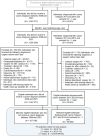Risks of cataract surgery in solid and hematologic cancer survivors
- PMID: 40826274
- PMCID: PMC12361443
- DOI: 10.1038/s41598-025-16229-5
Risks of cataract surgery in solid and hematologic cancer survivors
Abstract
In this nationwide retrospective cohort study, we investigated the risk of cataract surgery among cancer survivors compared to propensity score (PS)-matched non-cancer controls. This study included 4.5 million adults in the National Health Insurance Service database who underwent health screenings between year 2011 and 2014. PS-matching at a 3:1 ratio resulted in 167,766 non-cancer controls and 55,968 patients with cancer. During a period of up to 10 years, 7703 (13.8%) patients with cancer and 24,369 (14.5%) patients in the control group underwent cataract surgery. Survival analysis showed no difference in cataract surgery risk between the overall cancer cohort and controls. Analysis by cancer types showed that solid cancers did not increase the risk of cataract surgery compared to controls, whereas hematologic cancer survivors exhibited a significantly increased risk of cataract surgery, particularly between 2 and 5 years post-index date (hazard ratio at second year, 1.81; 95% confidence interval, 1.07-3.05; p = 0.027). Among hematologic cancer survivors, factors significantly associated with increased cataract surgery risk included advanced age, leukemia diagnosis, bone marrow transplantation, and prolonged steroid use. This study highlights the elevated risk of cataract surgery among hematologic cancer survivors, emphasizing the need for long-term ophthalmologic follow-up in this population.
Keywords: Cancer survivors; Cataract; Hematologic neoplasms.
© 2025. The Author(s).
Conflict of interest statement
Declarations. Competing interests: The authors declare no competing interests.
Figures



Similar articles
-
Nutritional interventions for survivors of childhood cancer.Cochrane Database Syst Rev. 2016 Aug 22;2016(8):CD009678. doi: 10.1002/14651858.CD009678.pub2. Cochrane Database Syst Rev. 2016. PMID: 27545902 Free PMC article.
-
Combined surgery versus cataract surgery alone for eyes with cataract and glaucoma.Cochrane Database Syst Rev. 2015 Jul 14;2015(7):CD008671. doi: 10.1002/14651858.CD008671.pub3. Cochrane Database Syst Rev. 2015. PMID: 26171900 Free PMC article.
-
Prescription of Controlled Substances: Benefits and Risks.2025 Jul 6. In: StatPearls [Internet]. Treasure Island (FL): StatPearls Publishing; 2025 Jan–. 2025 Jul 6. In: StatPearls [Internet]. Treasure Island (FL): StatPearls Publishing; 2025 Jan–. PMID: 30726003 Free Books & Documents.
-
Trifocal intraocular lenses versus bifocal intraocular lenses after cataract extraction among participants with presbyopia.Cochrane Database Syst Rev. 2023 Jan 27;1(1):CD012648. doi: 10.1002/14651858.CD012648.pub3. Cochrane Database Syst Rev. 2023. PMID: 36705482 Free PMC article.
-
Types of intraocular lenses for cataract surgery in eyes with uveitis.Cochrane Database Syst Rev. 2014 Mar 4;3(3):CD007284. doi: 10.1002/14651858.CD007284.pub2. Cochrane Database Syst Rev. 2014. PMID: 24590672 Free PMC article.
References
-
- Youn, J. C. et al. Cardiovascular disease burden in adult patients with cancer: an 11-year nationwide population-based cohort study. Int. J. Cardiol.317, 167–173. 10.1016/j.ijcard.2020.04.080 (2020). - PubMed
-
- Schultz, P. N., Beck, M. L. & Stava, C. Vassilopoulou-Sellin, R. Health profiles in 5836 long-term cancer survivors. Int. J. Cancer. 104, 488–495. 10.1002/ijc.10981 (2003). - PubMed
MeSH terms
Grants and funding
LinkOut - more resources
Full Text Sources

